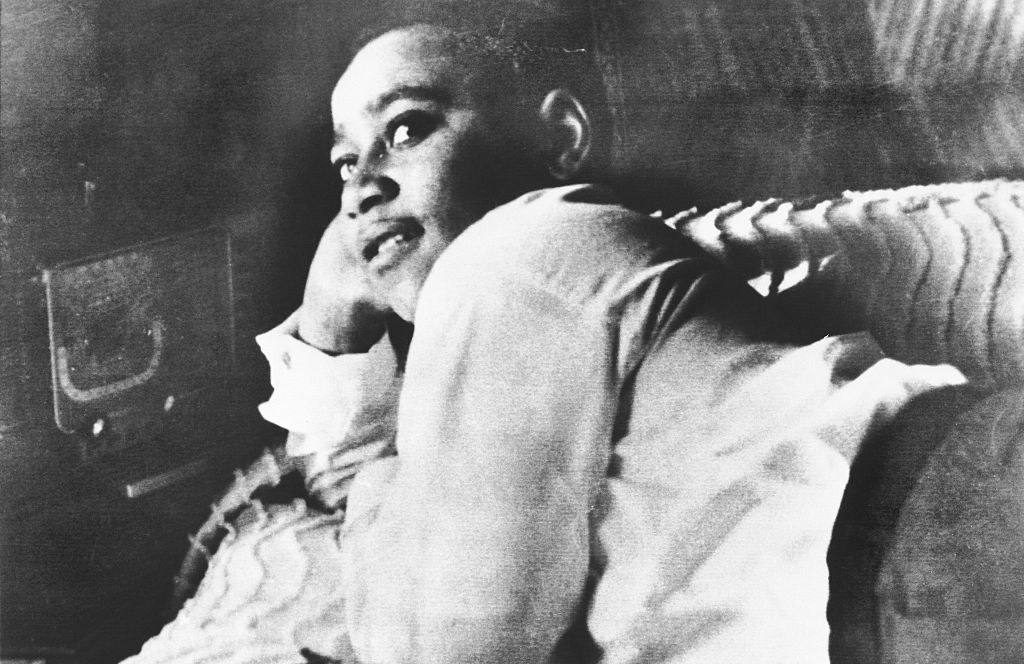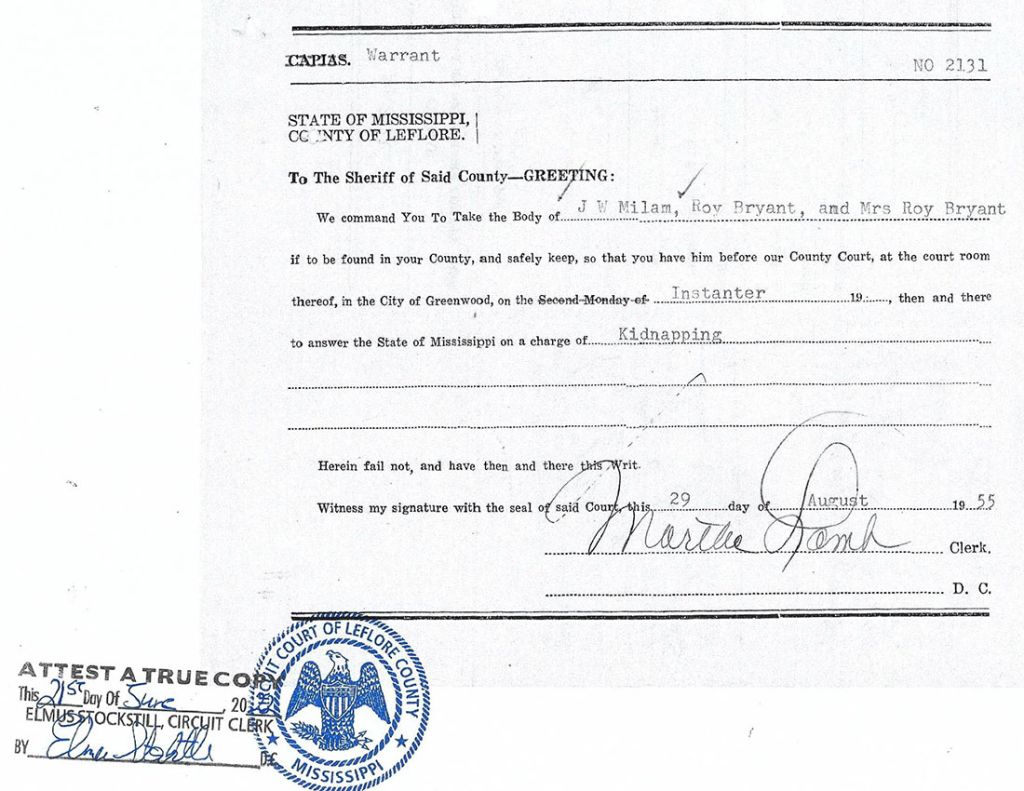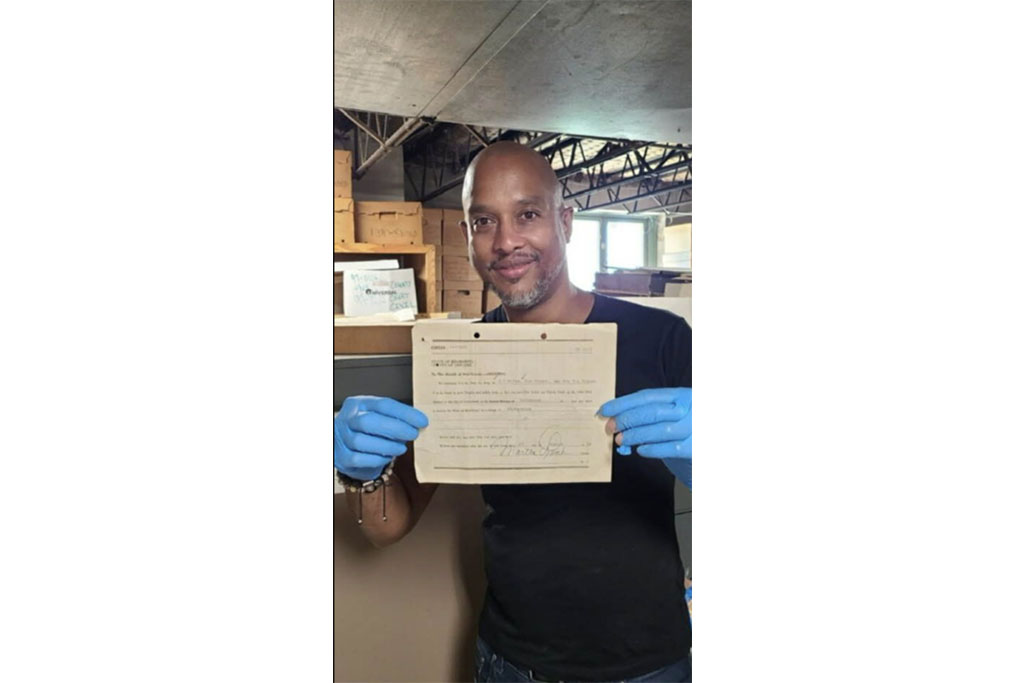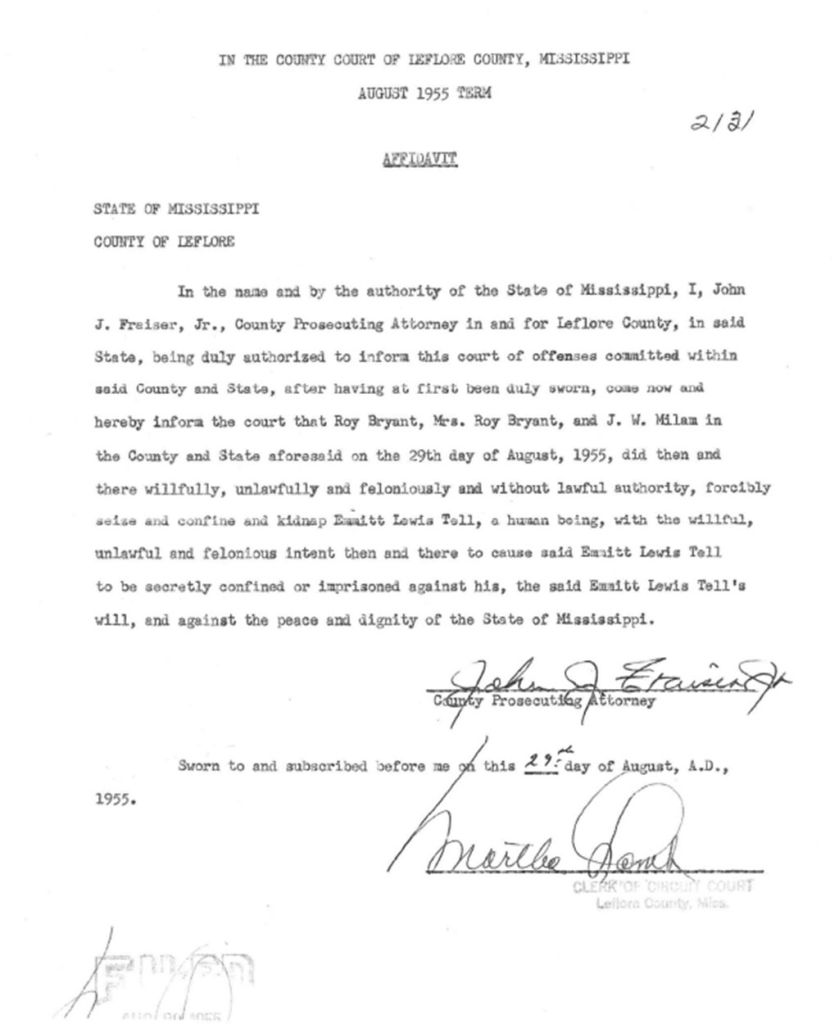Justice For Emmett Till: Holding Carolyn Bryant Donham Accountable
‘Racing Against Time’: The Quest To Hold Carolyn Bryant Donham Accountable For Emmett Till’s Lynching

Emmett Till is shown in this undated photo. | Source: Bettmann / Getty
Brooklyn-based filmmaker Keith Beauchamp has spent the last 27 years of his life obsessively trying to get an old racist white woman put in prison before she dies, like her accomplices did.
That woman is Carolyn Bryant Donham, who is now 88 and supposedly living in North Carolina. Beauchamp wants her held accountable for the role she played in the 1955 abduction, torture and lynching of 14-year-old Emmett Louis Till.
Till was visiting Mississippi from Chicago in August that year. During a trip to Bryant’s Grocery and Meat Market, Donham falsely accused Till of flirting with her and grabbing her. Witnesses said that he only whistled at her. The accusation prompted her then-husband Roy Bryant and his half-brother J.W. Milam to abduct the teenager at gunpoint from his great-uncle’s home. After torturing and lynching Till, the men tied a cotton-gin fan around his body and threw him into the Tallahatchie River where he was found several days later. His mother, Mamie Till-Mobley, insisted that her son have an open casket so that the world could see the savagery of white supremacist aggression which has always treated Black children as enemy combatants in the same brutal manner as adults.
Milam and Bryant were charged with murder but acquitted by an all-white, all-male jury. The men confessed to their crimes in an interview with Look magazine just months later, but double jeopardy laws prevented them from being tried again. Though Donham was also named on the original arrest warrant, she was never served.

The old unserved warrant for Carolyn Bryant’s arrest in 1955. | Source: Till Freedom Come Productions LLC
Beauchamp assured Till’s mother, who passed away in 2003, that he would not stop fighting for justice.
“I promised her that I would do everything in my power to make sure justice is done. I go to bed thinking of Till and I wake up thinking of Till,” Beauchamp says in a phone interview.
He spent almost a decade working on a documentary, “The Untold Story of Emmett Louis Till.” His research and the film prompted the Department of Justice (DOJ) to reopen the case in 2004. However, in 2007, a Mississippi grand jury returned a No Bill and declined to issue new indictments. The DOJ and FBI reopened the investigation in 2017 after historian Timothy B. Tyson revealed in his book, “The Blood of Emmett Till,” that Carolyn Bryant Donham had recanted. But in December 2021 the case was closed again for lack of sufficient evidence to support a federal prosecution.
“Every time I think I’m done, something happens. I find some new piece of evidence that revives the case again,” Beauchamp says.
The morning of June 21 became yet another watershed moment in this 67-year-old case.
Beauchamp and his colleagues, which included Till’s family members, found themselves in the basement of the historic Leflore County Courthouse in Greenwood, Mississippi, which was once home to the Sheriff’s Department and county jail. The team was surrounded by disarray and wall-to-wall file cabinets and shelves with hundreds of file boxes with dates ranging from the early 1900s to the present. Some of the old jail cells were even crammed with files.
Less than two hours into their search, the team broke out in tears as they passed around the unserved warrant for Bryant which was retrieved from a file folder in a box. Finally, they possessed the missing link in this historic case — the documentation to bring the only living culprit to justice after 67 years.
“I had the warrant in my hand. We took the paper clip off and discovered that the affidavit of arrest and the minutes page was attached to it. I was shocked,” Beauchamp says.

Brooklyn-based filmmaker Keith Beauchamp holds a copy of the 1955 unserved warrant for Carolyn Bryant. | Source: Till Freedom Come Productions LLC
Much of the media attention last week focused on the discovery of the warrant.
“But the warrant is the smoking gun,” says Jaribu Hill, a civil rights attorney and executive director of the Mississippi Workers Center for Human Rights. “The affidavit of arrest and the minutes are just as significant.”
Hill has been representing the Till family since 2017.
The affidavit of arrest shows that there was probable cause to arrest Carolyn Bryant in 1955. The minutes tell the story of the proceedings that occurred about the issuance of the warrant, which has not expired. There is no statute of limitations on the kidnapping charge.
Hill says that the discovery of the three documents together was “a victorious find in this ongoing demand for justice. These documents were not part of previous investigations. We consider this to be new evidence, new discovery that should be taken into account.”
The fact that a white judge, in 1955, signed a warrant, agreeing there was enough evidence to charge Carolyn Bryant, is significant.
“To me this says there was a glimmer of hope that the principles of the justice system would be equally applied,” Hill says. “But this was trumped by the vigilante extrajudicial law enforcement practices of the day. States’ rights officials had no intention of respecting that process as it related to the death of a Black child. White women were placed on a pedestal and were above reproach.”
The newly discovered warrant, dated Aug. 29, 1955, lists the names of “Mrs. Roy Bryant” along with her husband and his half-brother who was also his second cousin. All three were charged with kidnapping. Beauchamp says Carolyn Bryant was never served because law enforcement officials met and refused to arrest her because she was a young mother with children to take care of.
“There was communication between the Memphis field office of the FBI and headquarters in D.C. The document says that there was a warrant out for Carolyn Bryant’s arrest, but they couldn’t find her. They weren’t going to arrest her. They chose not to arrest her,” Beauchamp says.
“The protection of white womanhood is preventing justice,” he added. “We are dealing with a white woman who is in her eighties. They didn’t arrest her because of a chivalrous impulse. It was the gentlemanly thing to do for white women. This whole case has always been about the protection of white women.”
Attorney Hill agrees.
“Carolyn Bryant is a key person, and perhaps the most important person who has not been held accountable for 67 years,” Hill says. “Her role in the kidnapping and lynching of Emmett Till has never really been addressed to the satisfaction of family members and the public. If she had not falsely accused him, Till would not have been killed. You can’t separate the kidnapping from the lynching. This woman has been allowed to escape criminal prosecution and basic levels of inquiry that would allow a grand jury to address her culpability. And she has never expressed remorse.”
Like Bryant, Mamie Till was a young woman with a child in 1955, but she and her dead son didn’t warrant the same consideration given to Bryant.
“They ignored the reality of Mamie Till’s standing as a young Black mother whose only child was killed,” Hill says.
But Carolyn Bryant wasn’t just an average low-profile young white mother, she explains. She had powerful political connections. Her sister, Charlotte Holloway Buchanan, who died in March 2021, was an alderman in Indianola where the White Citizens Council was born. She was also a vice mayor, court reporter and the first woman to be elected Justice Court judge of Sunflower County where Till may have been killed before being dumped. It has been rumored that Bryant is related to former Mississippi Gov. Phil Bryant, who was also born and raised in the small town of Moorhead, in Sunflower County where the Bryant sisters are from. Though the former governor has denied being a family member of the woman responsible for Till’s murder, some local Black folks still believe the relationship.
“Her family connections, her sister’s political and judiciary connections helped protect her,” says Hill. “Those connections fostered a 67-year-old cover-up and those dots have not been connected. But we know there’s always been one guiding principle in this case – protect the white woman at all costs.”
Now that the warrant, affidavit of arrest and minutes have been found, what are the next steps in this quest for justice?

A copy of the affidavit of arrest. | Source: Till Freedom Come Productions LLC
Mississippi District Attorney Dewayne Richardson, whose office would prosecute a case against Donham, has not offered any comment on the discovery of this outstanding warrant. A phone call and e-mail to his office have not yet been returned.
“The DA has not responded. He keeps hiding behind the DOJ’s previous decision not to reopen the case because of jurisdiction,” Beauchamp says. “But he can’t just ignore this. He has to serve the warrant. If he decides not to, the warrant must be rescinded, and the only way that can happen is if he goes before a judge and shows probable cause.”
Hill says that DA Richardson “is aiding and abetting with his silence,” and she has questions for him that the public needs answered: “Why have you been silent? Why have you not considered the option of reopening the case at the state level? What are your concerns about reactivating the case to fully explore the culpability of Donham?”
This week, Hill plans to hand-deliver a letter to Richardson’s office requesting that he facilitate the execution of the warrant for Donham’s arrest by contacting the Sheriff’s Department in Leflore County.
“If he doesn’t then we plan to explore other legal and administrative options,” Hill says. “We won’t leave it where he has left it. We want to hold DA Richardson accountable so that he will conduct a transparent investigation.”
Beauchamp is determined to bring closure to this historic case but realizes some of the obstacles to the quest for justice.
In this and similar cases, “We are racing against time,” he says. “Some elders in our communities have given up on trying to get justice in these old civil rights murder cases. I’m tired of seeing our elders have to accept what the government says – that there’s nothing more they can do. We have to get justice. We have to be progressive, despite what anyone has to say.”
He points out the connections between Till and the state killings of people like George Floyd, Michael Brown and last week’s police murder of Jayland Walker in Akron, Ohio, where eight officers fired 90 shots at the unarmed man, hitting him with 60 bullets.
“Those victims are the same as Emmett Till and we cannot disconnect it. This is legalized lynching that is still happening,” Beauchamp says.

From left to right: Khali Rasheed, Deborah Watts, Teri Watts (relatives of Emmett Till), and Melissa Earnest searching through boxes at the courthouse. Keith Beauchamp is in the foreground. | Source: Till Freedom Come Productions LLC
As for the arguments that Bryant is too elderly to be brought to justice, Beauchamp says he watched the recent sentencing of a 101-year-old Nazi ex-guard.
“You cannot tell me that this kind of justice cannot happen in this country,” Beauchamp says. “I want people to understand that this is not difficult to do.”
Beauchamp is adamant that calls for forgiveness are also not enough.
“Forgiveness is not the same as justice,” he says.
The lynching of young Emmett Till made history and stands as a heartbreaking reminder of the ways that racism continues to desecrate Black lives in this country. Serving that warrant and arresting Bryant would be a powerful example of righting at least one wrong.
“People like to portray Carolyn Bryant as being a victim of the times. But they forget that she was a 21-year-old murderer,” Beauchamp says. “We’re used to hoping that people will have their come-to-Jesus moment. But in our racial reality in America, many of these people die evil.”
Dr. Stacey Patton is an award-winning journalist and author of “Spare The Kids: Why Whupping Children Won’t Save Black America” and the forthcoming “Strung Up: The Lynching of Black Children In Jim Crow America.”
SEE ALSO:
‘Where Is Justice For Emmett Till?’ People Still Want Carolyn Bryant To Answer For Lynching
[ione_media_gallery id=”3844698″ overlay=”true”]








